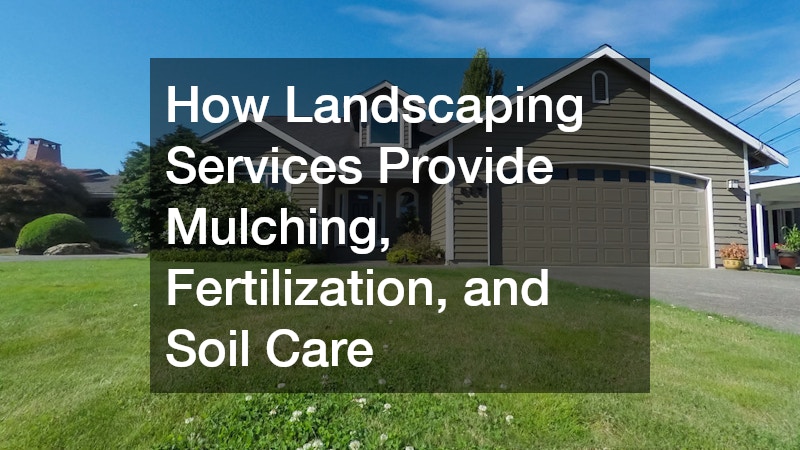
This article explores how professional landscaping services enhance gardens and yards through mulching, fertilization, and soil care practices, ensuring healthy and vibrant plant life.
Mulching is the practice of covering the soil with organic or inorganic materials. This protective layer serves multiple important functions within the garden ecosystem.
Video Source
Organic mulches, such as wood chips, straw, or leaf litter, not only help suppress weeds but also contribute beneficial nutrients back into the soil as they decompose. On the other hand, inorganic mulches, like rubber or gravel, provide a durable option for landscaping without the need for frequent replenishment.
The application of mulch can aid in moisture retention in the soil, which is particularly beneficial during hot and dry weather conditions. This moisture conservation leads to less frequent watering, which ultimately conserves water and reduces the overall maintenance workload for gardeners. Additionally, mulching regulates soil temperature, protecting plant roots from extreme heat in the summer and cold in the winter, thereby promoting a more stable environment for growth.
By employing professional landscaping services for mulching, homeowners can experience uniform application and selection of appropriate materials tailored to their specific garden needs. Experts know which types of mulch work best for different plant species and can create aesthetically pleasing designs while maximizing the functionality of the mulch. Regularly refreshed mulching also contributes to a neat and tidy landscape that enhances the overall curb appeal of a property.
Fertilization is a science that requires a deep understanding of plant needs and soil composition. Landscaping professionals begin this process with soil tests that provide valuable insights into nutrient levels and soil pH. These tests help identify deficiencies that may be limiting plant growth and inform decisions on which type of fertilizer—whether organic or synthetic—should be applied. Different fertilizers supply different nutrients, so the selection process is critical for effective plant care.
The timing of fertilizer application is also essential to maximize its benefits. Landscaping services follow seasonal patterns and plant growth stages to deliver nutrients just when plants need them most. For example, applying fertilizers in early spring can provide a robust boost to emerging growth, while late summer applications can prepare plants for dormancy in the fall. This strategic approach to fertilization helps prevent nutrient runoff and contributes to environmentally responsible landscaping practices.
Soil care is not just about adding fertilizers; it involves a holistic approach to maintaining and improving soil health. Landscaping services typically conduct thorough assessments of the soil to understand its composition and health status. This may involve checking for compacted layers, drainage capabilities, and organic matter content, all of which affect plant growth and health. By identifying these factors, professionals can make informed recommendations for amendments that will revitalize the soil.
A soil amendment may include adding organic matter such as compost or well-rotted manure, which enhances soil structure and promotes a diverse ecosystem of microorganisms. In addition, landscaping professionals focus on balancing soil pH levels to optimize nutrient availability. This comprehensive approach encourages rich and fertile grounds for various plants and can lead to thriving gardens and landscapes.
Soil care also involves ongoing monitoring and adjustments as environmental conditions change. Professionals are trained to spot signs of poor soil health, such as stunted growth or unusual discoloration in plants. Regular soil testing allows for adaptations in management practices, ensuring that amendments and techniques evolve to sustain long-term plant health. With proper soil care, landscapes become resilient and sustainable, benefitting homeowners and the environment alike.
Regular maintenance is essential for flourishing landscaping and enhancing the overall beauty of your outdoor space. By committing to ongoing services that include mulching, fertilization, and soil care, landscaping professionals can ensure that plants remain healthy and vibrant throughout the seasons. This level of care encourages a dynamic garden that not only looks appealing but also supports local wildlife and promotes biodiversity.
Moreover, having a routine care arrangement allows landscaping teams to identify potential problems before they escalate. Early detection of pests or diseases can save considerable time and money in treatment and recovery. Regular visits by landscaping professionals ensure that mulching materials are fresh and effective, fertilizers are applied at the right times, and soil is kept in optimal conditions—all contributing to a healthier landscape.
The cumulative benefits of regular maintenance extend beyond aesthetics and plant health. Homeowners who engage professional landscaping services can find peace of mind in knowing their gardens are well cared for. This ongoing investment in their property ultimately boosts its value and attractiveness, creating a serene outdoor environment for relaxation and enjoyment.
Utilizing landscaping services for mulching, fertilization, and soil care not only enhances the aesthetic appeal of your property but also promotes the health and longevity of your plants, ensuring a thriving landscape. By embracing expert techniques and practices, homeowners can cultivate lush gardens that are not only beautiful but also sustainable and resilient in the face of changing environmental conditions.
